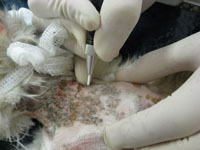Services
 Intradermal allergy testing (skin testing): Intradermal allergy testing (skin testing):
This is a
procedure in which small amounts of allergens (e.g.
pollens, dust, molds, insects, etc.) are injected into the
skin in order to determine if a patient is allergic to these
substances. This is considered the "gold standard" test in
veterinary medicine.
Biopsies:
Dermatohistopathology: A procedure that
entails taking a tiny section of affected skin from your
pet. The skin can then be processed and observed on a
microscopic level to help determine what type of skin
disease your pet has. Dr. Senter is trained in
dermatopathology and interprets most of his biopsies.
Cultures:
Cultures may be needed when infectious diseases such as bacteria, fungi, or mycobacteria are
suspected. Culturing the skin or discharge from the skin enables us to grow the organism in the lab and
determine which antimicrobial treatments will work best for that infection.
Cytologies:
This entails taking samples from the outer layers of the skin, applying a special stain, and
inspecting these samples under the microscope for infections, inflammatory cells, tumor cells, etc.
Laboratory (blood and urine) tests:
There are a
wide variety of lab tests that can be performed to help
identify problems with internal organ systems, check
antibody levels against certain infections, and monitor for
possible side effects to medications, to name a few.
Skin scrapings:
A quick procedure that entails using
a dull blade and mineral oil to gently scrape the surface of
the skin and collect a sample. This sample is then placed
on a microscope to look for mites that live on the skin or
in the hair follicles.
Cryosurgery:
A procedure where liquid nitrogen is
used to quickly freeze and eliminate skin tumors.
 Video otoscopy: Video otoscopy:
A fiber-optic scope that enables us to visualize and perform procedures on the ear canal
and eardrum much better than with old-fashioned handheld otoscopes. We can clean the ear more
thoroughly and more safely through tiny channels in the scope along with our special suction and flushing apparatus.
Carbon dioxide laser surgery:
Our laser is used for removal of masses or warts on the skin or in the ears. It cauterizes blood vessels as it cuts and sears the nerve endings making it a bloodless and minimally painful procedure.
|


 Intradermal allergy testing (skin testing):
Intradermal allergy testing (skin testing): Video otoscopy:
Video otoscopy: